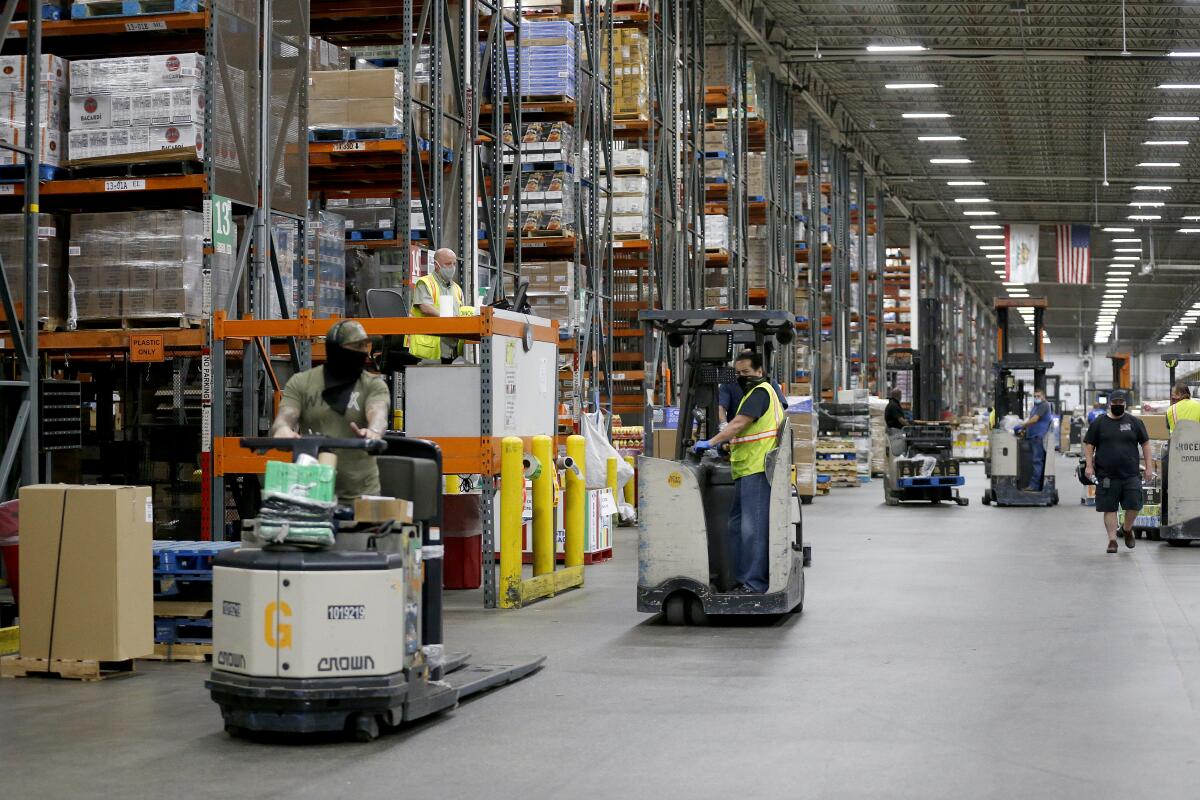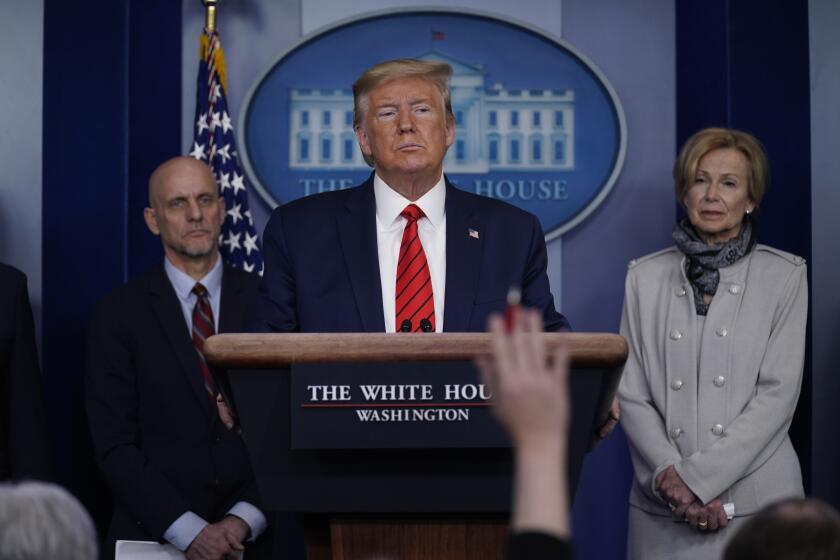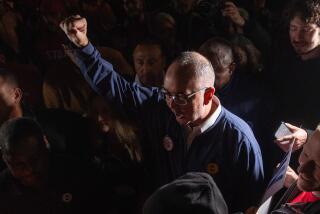Column: Big employers are already shortchanging their ‘hero’ workers

- Share via
It’s not unusual for big corporate employers to pretend that the people who make their businesses go aren’t mere “employees.” They’re “associates” (Walmart and many others). Or “cast members” (Disney). Or “partners” (Starbucks). Or “team members” (Best Buy).
Lately, a new label has joined this list: “Heroes.” Kroger, the parent of the Ralphs supermarket chain and others, used the term when announcing a $2-per-hour bump in the pay of its front-line workers, dubbed a “hero bonus” in recognition of the workers’ valor in staying at their posts during the coronavirus pandemic.
Well, that didn’t last long.
So does this mean that you will require companies that receive the bailout money from the taxpayer to keep their workers on the payroll?
— Sen. Elizabeth Warren to Treasury Secretary Steven Mnuchin. He answered no.
Kroger announced earlier this month that it would end the hero bonus on May 17, though it was subsequently shamed into replacing the hourly bump with a one-time “thank you” bonus of $400 for “qualified full-time associates” (there’s that word again) and $200 for part-timers.
As my colleague Suhauna Hussain reported, the “hero bonuses” and “appreciation pay” have been disappearing through this month, even as the number of new infections and deaths remained high and the hazards for consumer-facing employees may even have increased with relaxation of stay-at-home rules.
Nevertheless, raises of $3 an hour instituted by Starbucks and a $2 hourly raise at Target are scheduled to end at the end of this month, Hussain reported.
There’s no mystery about what’s going on here. Employers’ use of terms such as “associates” or “partners” is simply designed to obscure the true relationship between management and workers. These terms imply that the workers have a full voice in how the business is run and an equal claim on the profits, not to mention some semblance of autonomy.
But manifestly that’s not the case. With few exceptions, generally in union shops, these are unequal relationships in which the employer has almost all the power.
That includes political power. As we’ve observed, return-to-work policies in states such as Texas and Iowa have been backed by the coercive threat that workers will lose their unemployment benefits if they choose to stay sheltered from the coronavirus at home, or who have to care for children or other family members.
The truth is that all the capacity for choice remains in the hands of employers: They can decide whether to reopen their businesses, but if their reopenings place employees at risk, government will back the employers.
The owners of meatpacking plants, which had become hotspots of coronavirus infection in several states, won the support of the Trump administration in their desire to keep operating, sometimes in violation of local rules and good anti-virus practice. Trump on April 28 issued an executive order to allow meat processing plants to stay open under the authority of the Defense Production Act, preempting local authorities.
The U.S. is suffering shutdown fatigue because the COVID-19 war has stagnated.
Let’s not overlook Tesla, whose CEO Elon Musk aggressively challenged California’s stay-at-home rules and dared local officials to arrest him for reopening the firm’s Fremont factory without clearance.
The company warned workers that they could lose their unemployment benefits if they were recalled to work but chose to stay home over COVID-19 concerns. The company did say that the status of benefits would be up to the state, not the company, however.
Musk wasn’t arrested for reopening the Fremont plant, even though he plainly flouted the law. Instead, local authorities met with Tesla executives to work out what amounted to a compromise, allowing the factory to reopen ahead of the schedule that the authorities had set down initially.
Management’s lionization of rank-and-file labor in their rhetoric and its mistreatment of workers in reality is, of course, an old story. It played out in corporate America’s response to the massive tax cut awarded businesses by a Republican Congress in December 2017.
The tax cut was ostensibly designed to give businesses capital to invest in operations and their workforces. Instead, a disproportionate share of the tax cuts went into stock buybacks, which represent capital funneled directly to shareholders.
Workers crammed virtually shoulder-to-shoulder to tend production lines moving at inexorable speeds, high rates of disease and injury, low pay and unforgiving rules on time off or meal and bathroom breaks. Descriptions of today’s meatpacking industry sound lifted from Upton Sinclair.
An analysis by the Congressional Research Service published a year ago found that $1 trillion in buybacks had been announced by the end of 2018, while there was “no indication of a surge in wages in 2018 either compared to history or relative to GDP growth.”
What gains workers felt from the tax cuts generally came in the form of one-time bonuses, which have only limited and temporary impact on an employer’s bottom line, rather than hourly wage increases, which have staying power.
The same phenomenon is playing out in “hero pay,” which employers often have described as temporary, designed to end after the pandemic emergency ends -- or as in the case of some employers, even earlier.
The CARES Act, which was passed by Congress and signed by President Trump at the end of March, aimed to provide relief for workers laid off or furloughed during the crisis in the form of a boost in unemployment benefits and $1,200 stimulus checks for most adult Americans.
But a sizable chunk of the measure’s outlay of more than $2 trillion went to businesses, with no guarantee that it would be used to maintain employment or boost wages.
That produced a contentious exchange between Sen. Elizabeth Warren (D-Mass.) and Treasury Secretary Steven Mnuchin, who has control over the distribution of roughly $500 billion in business loans under the CARES Act, during a Senate hearing Tuesday
Economic recovery after the crisis will require employment and reemployment, Warren said. “So does this mean,” she asked, “that you will require companies that receive the bailout money from the taxpayer to keep their workers on the payroll?”
In recent days, alarm about the economic impact of the novel coronavirus have turned conservatives who weeks ago were boasting about the shrinking of the U.S. government into raving Keynesians, proclaiming the virtues of deficit-financed economic stimulus.
Mnuchin would not say so. “I take pride in the bipartisan support on these bills,” he said, “and these specifics were negotiated on a bipartisan basis.”
Warren reminded him that the act gave him “specific authority to determine the terms on which these loans are made.” But he still refused to commit to making employment stability a condition of the loans.
Big employers might argue that the bonuses reflect the sacrifices under which employees are working during the crisis -- work is harder and the health risks greater for those dealing with customers person-to-person.
That’s true, but it’s not the whole story. Some retailers, particularly, have recorded outsized gains in sales as consumers stocked up for lengthy stays at home or shifted their buying patterns.
Target’s same-store and other comparable sales soared by 10.8% in the quarter ended May 2 compared with the same quarter a year ago. At Walmart the year-over-year quarterly gain was 10%.
Both companies, like many others, reported spending heavily on employee bonuses and other costs related to COVID-19. Target placed the cost of “extended benefits” for “team members” and virus-related safety measures at $500 million; Walmart reported “incremental costs” related to COVID-19 at nearly $900 million.
It’s proper to observe that Target ranks as one of the more generous big employers in terms of crisis pay. The company, which previously said it would increase its minimum wage to $15 per hour from $13 by the end of this year, announced that its crisis increase of $2 per hour for store and distribution workers through July 4. Walmart hasn’t raised hourly pay, but has announced two rounds of bonuses for hourly workers in its stores, clubs, offices and supply chain, each of $300 for full-time workers and $150 for part-timers.
Despite its virus-related costs, Target still managed to return $941 million to shareholders in the quarter, thanks to a 3.1% increase in its dividend per share and $609 million in share buybacks. (The company suspended its buyback program one month into the quarter.)
Target’s operating profit during the quarter was down 58.7% from the year earlier, but still came in at $468 million on quarterly revenue of $19.6 billion. Walmart paid out $2.3 billion to shareholders during the quarter; its operating income actually rose by 5.6% to $5.2 billion compared with a year ago, on revenue of $134.6 billion.
Neither company may see sales gains like that again, but it’s a fair bet that both will be able to hold on to at least some of improvements in market share represented by the most recent figures. Under the circumstances, the proportion of gains that flowed to workers through temporary bonuses looks like a pittance.
Economic and political pundits have been trying in recent weeks to game out what in American society will change permanently as a result of the coronavirus crisis, and what practices will snap back to the old ways.
The reaction of employers who have rushed to end bonuses and hourly wage increases suggests one thing that won’t change: Even where business improves, rank-and-file employees will still get the short end of the stick.
More to Read
Inside the business of entertainment
The Wide Shot brings you news, analysis and insights on everything from streaming wars to production — and what it all means for the future.
You may occasionally receive promotional content from the Los Angeles Times.














